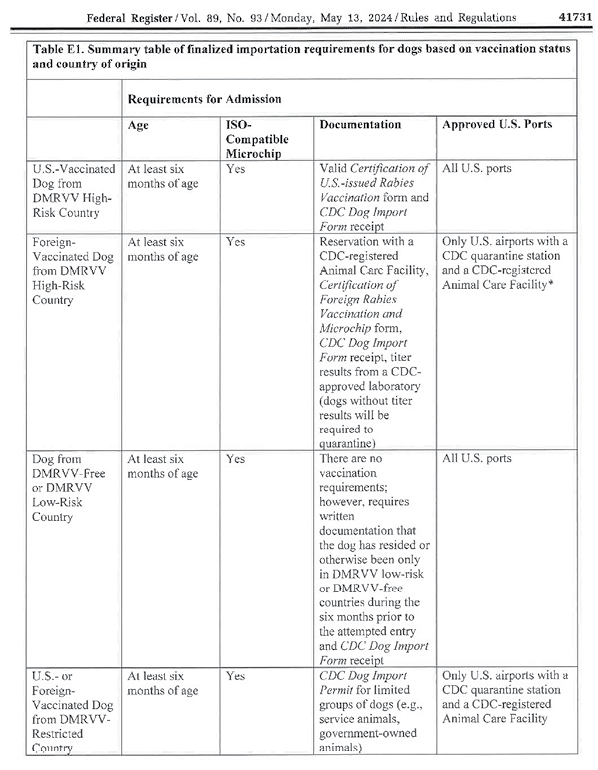CDC’s Sledgehammer Leaves Some Purebred Dog Fanciers to Navigate Rubble
CDC’s New Dog Import Rule: What It Does, Why It’s Important & Next Steps
On May 13, 2024, the U.S. Centers for Disease Control and Prevention (CDC) published a new rule, changing the requirements for importing a dog into the United States, effective August 1, 2024.1 As news of changes spread throughout the fancy, concerns—and social media misinformation—quickly reached a fever pitch.
This column seeks to provide some background and context that laid the foundation for CDC’s new rule, along with the important points you need to know about the new regulations if you travel internationally with dogs or work with breeders in other countries.
Background: What is CDC, and why is it regulating the import of dogs?
Historically, most requirements for importing dogs have been promulgated by the U.S. Department of Agriculture (USDA), where the focus is on animal health. The CDC, which is a division of the U.S. Department of Health and Human Services, steps in if an issue threatens human health. (A third federal agency, U.S. Customs and Border Protection, is typically the agency “on the ground” at ports of entry, and often ends up enforcing CDC and USDA import requirements.) This includes jurisdiction to act at the intersection of human and animal health, as in the case of dog-maintained rabies virus variant (DMRVV, aka canine rabies) and other serious diseases that can be transmitted from animals to humans.
The CDC has existing statutory authority under the federal Public Health Service Act2 to create enforcement rules and regulations to address serious threats to public health. This authority means that CDC does not need to go through the legislative process (passage by Congress and the President’s approval) to create new rules. Instead, it follows the regulatory process—including issue identification, rule drafting, and public comment—to create changes.
Rabies is a devastating virus that is nearly 100% fatal once clinical symptoms appear. CDC estimates that the importation of one rabies-infected dog costs federal, state, and local governments $270,000 for conducting public health investigations and administering rabies medications to exposed persons. That number jumps to $11.6 million if an exposure results in one human death. More importantly, reintroduction of the virus into the U.S. could result in the loss of animal and human life. As a result, it is part of CDC’s scope to protect the U.S.’s classification as free of canine rabies, which it has enjoyed since 2007, and to best prevent and deter reintroduction of canine rabies, including through the importation of dogs, into the U.S. The American Kennel Club (AKC) views this work as vitally important to protecting public and animal health.
The CDC rule seeks to prevent and deter the importation of dogs into the United States that are carrying DMRVV (canine rabies) and other diseases or pathogens that pose a serious threat to public health.
Generally, current U.S. law requires all dogs entering the U.S. for transfer (sale, adoption, etc.) to be at least six months of age; but an exemption to USDA import requirements allows the importation of personal pets with demonstrated immunity to canine rabies to enter the U.S. prior to six months of age. Assuming a puppy was vaccinated against rabies at three months of age and one month was needed for it to develop full immunity, a puppy as young as four months of age could be imported into the U.S. This exemption has facilitated cross-border travel for dog shows and other competitive events, and international collaboration among breeders.
While no issues were noted with those types of activities, CDC documented numerous importations every year in which “flight parents” transport dogs for the purpose of resale, adoption, or other transfer of ownership that did not meet U.S. entry requirements. Flight parents often claim the dogs as their personal pets to avail themselves of the USDA exemption, thereby avoiding entry requirements and potential tariffs and fees.
In 2015, a rabid dog was part of a group of eight dogs and 27 cats imported from Egypt by an animal rescue group. As part of the investigation, rescue workers in Egypt admitted that the dog’s rabies vaccination documentation had been falsified to evade CDC entry requirements. In 2017, a flight parent imported four dogs from Egypt on behalf of a rescue organization. Again, one of the dogs tested positive for canine rabies; and an investigation revealed the dog’s rabies vaccination documentation was fraudulent. In 2019, 26 dogs were imported into the U.S. from Egypt by a rescue organization, with appropriate vaccine documentation and serologic documentation from an Egyptian government-affiliated rabies laboratory. Unfortunately, three weeks after arrival, one dog tested positive for rabies. A subsequent retesting of all the dogs in the shipment revealed that 18 dogs lacked serologic evidence of vaccination, which raised suspicions that health documentation had been falsified for all dogs in the shipment.
These importations resulted in the CDC issuing a temporary suspension for dogs entering the U.S. from Egypt.3
Then in 2020, while as many public health resources as possible were needed to address the COVID-19 pandemic (and the demand for pets skyrocketed), CDC observed a troubling trend: a 52% increase in the number of dogs that were ineligible for admission into the U.S. due to falsified or fraudulent documentation. The trend continued through June 2021, when 33 dogs and one cat were imported into the U.S. from Azerbaijan by an animal rescue organization with what appeared to be valid rabies vaccination documents. Three days after arrival, one dog tested positive for rabies. Because the other animals that were part of the shipment and exposed to the rabies-positive dog had been quickly dispersed across nine states, the largest, multi-state, imported rabid dog investigation in U.S. history followed. This time, it was improper vaccination practices by the veterinarian in Azerbaijan that likely contributed to the inadequate vaccination responses noted in about half of the animals in the shipment and discovered via CDC-performed prospective serologic monitoring.
This confluence of events led CDC to impose a temporary suspension on dogs entering the U.S. from canine rabies high-risk countries.4 Since the suspension was imposed, CDC noted decreased instances of fraud, fewer dogs being denied entry into the country, and fewer sick or dead dogs arriving in the U.S., which resulted in fewer federal and state resources being needed to address issues with inadequate vaccinations or documentation.
However, when the bans were relaxed as the pandemic declined, instances of fraud increased. It’s safe to say that the blatant and fraudulent exploitation of the USDA exemption for personal pets may essentially be considered the cause of its cancellation via the formalization of CDC’s new dog importation rules that go into effect in August.
What are the new requirements for bringing a dog into the U.S.?
Effective August 1, 2024, the CDC will require all dogs imported into the U.S. to:
- Appear healthy upon arrival,
- Be at least six months of age,
- Have an ISO-compatible microchip implanted for identification purposes, and
- Be accompanied by a CDC Dog Import Form online submission receipt (no cost).
There are additional requirements for the following:
- A dog entering the U.S. from a rabies-free or low-risk country may enter the U.S. at any U.S. port. It also must be accompanied by written documentation* that the dog has resided or otherwise been only in rabies-free or low-risk countries for the six months before attempted entry into the U.S.
- A U.S.-vaccinated dog entering the U.S. from countries considered high-risk for rabies must be accompanied by a Certification of U.S.-issued Rabies Vaccination form*, and may enter the U.S. at any U.S. port.
- A foreign-vaccinated dog from a high-risk country must have a reservation with a CDC-registered Animal Care Facility, be accompanied by a Certification of Foreign Rabies Vaccination and Microchip form* and a CDC Dog Import Form* online submission receipt, and titer results from a CDC-approved laboratory. Dogs without titer results will be required to quarantine. These dogs may only enter the U.S. at airports with a CDC quarantine station and a CDC-registered Animal Care Facility.
- A U.S.- or foreign-vaccinated dog from a rabies-restricted country must be accompanied by a completed Certification of Foreign Rabies Vaccination and Microchip form* and a CDC Dog Import Permit, and enter the U.S. only at airports with a CDC quarantine station and a CDC-registered Animal Care Facility. This is a limited exception for service and government-owned animals; otherwise, dogs from a rabies-restricted country are not permitted to enter the U.S.
*As of publication date, these forms are not yet available to the public. CDC indicates in its online FAQs that these forms will be brief and available online in the near future. More information is available at: https://www.cdc.gov/importation/bringing-an-animal-into-the-united-states/faqs-about-high-risk-dog-ban.html.
See the chart provided by CDC for a quick overview of vaccination and paperwork requirements for dogs entering the U.S. after August 1.

The CDC considered two key factors for protecting public health as related to importing dogs into the U.S.: The dog’s vaccination status and its country of origin. A third factor, the ability to verify age based on dentition was also considered important. This, in part, is the reasoning for requiring all dogs to be a minimum of six months of age.
AKC Concerns: Disproportionate Impact on Low-Risk Purebred Dog Breeders & Competitors
AKC recognizes the importance of regulations that seek to protect pet and public health, including protecting against reintroduction of DMRVV (canine rabies) in the United States. We also recognize CDC’s goal of reducing opportunities for fraud that threaten our status as a DMRVV-free country, and the need to improve efficiency for the importation of dogs. AKC appreciates that the rule does improve and streamline some
import documentation.
However, AKC has also expressed concerns that the new CDC dog importation rule is overly broad. This broad approach may successfully eliminate the public and animal health threats that would otherwise come with the importation of unhealthy or rabies-positive dogs; but purebred dog enthusiasts could end up being collateral damage.
By definition, purebred dog enthusiasts provide a very high level of care for their dogs and are prepared to expend significant resources to travel internationally with young training and show prospects, import a personal animal or breeding stock, collaborate internationally, or participate in international dog events. The risk of rabies within this group of dogs is very low. The new rule effectively ignores this fact. CDC’s sledgehammer approach did not differentiate between the public health risks represented by a law-abiding dog owner importing a personally owned animal that will reside with and be cared for by a documented individual versus entities importing large quantities of dogs for unknown final consumers and that are already violating certain import requirements. CDC’s sledgehammer also fails to recognize the purpose for an importation and whether the importation is temporary, key differentiators of purebred dog enthusiasts who travel internationally to compete with their dogs. This is of particular concern for those event competitors who may travel between the U.S. and Canada, both of which are canine rabies-free countries, to compete with their dogs at events sanctioned by AKC or the Canadian Kennel Club.
CDC’s new rule also neglects to recognize the value of international collaboration among sportsmen and breeders of purebred dogs, particularly in preserving breeds at risk of extinction. For example, under current import requirements in effect through July, puppies that have reached four months of age and were vaccinated at three months of age, therefore considered fully vaccinated against rabies, may be imported by U.S. dog enthusiasts to begin training and assess future breeding quality. CDC’s new rule eliminates that possibility.
Problematic international animal rescue importations that were based on falsified or fraudulent documents resulted in the importation and distribution of rabies-positive dogs among the general population of the U.S. Conversely, purebred dog enthusiasts who import a personal animal or collaborate internationally, or dog event competitors who travel internationally, were not responsible for those importations and are not proven to create similar threats to the health of either the American public or our animals. CDC’s new rule nevertheless imposes new requirements and restrictions on these breeders and competitors, which AKC views as disproportionately impacting them.
AKC Engagement in this Issue
AKC has long worked with the National Animal Interest Alliance (NAIA) and the American Veterinary Medical Association (AVMA) to bring attention to the serious public health threat not only of DMRVV but also other harmful zoonotic diseases and/or pathogens that impact both human and
animal health. In addition to the rabies introductions cited by CDC, irresponsible imports for American retail rescue markets have been responsible for new or novel cases of canine influenza and brucellosis, among other canine diseases, and could also play a role in spreading potentially devastating zoonotic diseases such as African Swine Fever (ASF) and Avian Flu.
Advocacy by AKC, NAIA, and AVMA for the 2023-2024 Healthy Dog Importation Act (H.R. 1184/S. 502) has focused on strengthening USDA’s Animal, Plant and Health Inspection Service (APHIS) regulations, which historically have jurisdiction over animal imports. Language from this bill, which is currently included in the U.S. House version of the 2024 Farm Bill, addresses these concerns with a more precise approach. It requires imported dogs to be healthy, microchipped, free of parasites, and have a valid health certificate from an accredited veterinarian, but continues to allow the import of personally-owned dogs younger than 6 months of age.
AKC has also urged the CDC to take a thoughtful approach to the issue, targeting health threats while also limiting inconvenience to responsible dog enthusiasts who present a low risk profile for importing unhealthy dogs.
Individuals who follow AKC’s legislative/regulatory alerts or receive them from their club’s legislative liaisons (LL) likely received their first notice of the measure from an alert providing advanced notice of the proposed rulemaking in July 2023. Multiple alerts subsequently followed, providing information about the content of the proposed rule and guidance on opportunities to interact with the CDC about it. AKC’s official comments on the proposed rule were published in September 2023.
Club members who did not receive the alerts should check with their clubs to make sure their Legislative Liaison is actively forwarding alerts from AKC Government Relations, and that AKC GR has updated email contact information for the club’s LL. Legislative Liaisons play a straightforward but extremely crucial role for their clubs and club’s members by ensuring that they receive and recognize important legislative and regulatory alerts from the AKC. Clubs that do not have LLs are always welcome to name one and join the program. Any questions or updates about LL status should be sent to: [email protected].
AKC has also urged the CDC to take a thoughtful approach to the issue, targeting health threats while also limiting inconvenience to responsible dog enthusiasts who present a low risk profile for importing unhealthy dogs.
Next Steps
Given the existing statutory authority behind it, pushback against the new rule is more difficult and likely more time-consuming than what we typically see with legislation. AKC will continue to share our concerns with CDC and lawmakers about the disproptionate impact that will be experienced by purebred dog enthusiasts who import a personal animal and by owners who travel internationally or regularly transit land borders with their dogs, but impacted owners should prepare for the new requirements to be in effect and enforced on August 1. At this time, we are urging individuals who believe they will be impacted negatively by the new CDC dog import rules to express their concerns directly to CDC at: [email protected]. Individuals may wish to also cc their members of Congress on their communications to the CDC. To find out who represents you in Congress, visit: www.akcgr.org and click “more” in the menu bar and select “elected officials.”
AKC will also continue to support inclusion of the Healthy Dog Importation Act language in the Farm Bill. Although passage of this bill would not replace CDC regulations, it demonstrates that the dog world can play a meaningful role in creating reasonable, alternative solutions that both protect public and animal health without creating an undue burden on responsible dog owners.
AKC will also continue to provide updates on federal regulatory actions as developments warrant. For more information, contact AKC Government Relations at: [email protected].
Resources










